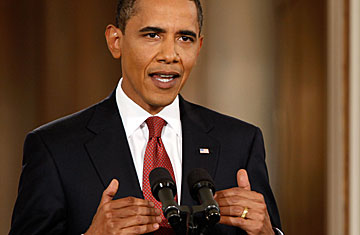
President Obama makes his case for health-care reform at a press conference at the White House
In his news conference on July 22, President Obama stuck to and defended a looming deadline for the House and Senate to pass their versions of health-care-reform legislation — even though it is becoming increasingly apparent that the two chambers are not going to meet it. "I'm rushed because I get letters every day from families that are being clobbered by health-care costs," the President said, adding, "If you don't set deadlines in this town, things don't happen. The default position is inertia."
But inertia is what some members of his own party might accuse the President himself of. And if they had any hope that Obama would get more specific on what he wants to see in a final health-care bill, they must have been sorely disappointed. While the President once again laid out his case for fixing the system to what he admitted was a skeptical public, he offered scant details as to how. "If we do not control these costs, we will not be able to control our deficit," he remarked. "If we do not reform health care, your premiums and out-of-pocket costs will continue to skyrocket." Obama did signal that he would be open to one proposal the House is considering to pay for health reform: an income-tax surcharge on families earning more than $1 million. "If I see a proposal primarily funded through taxing middle-class families, I'm going to be opposed to it," he stressed.
His appeal to the nation came as signs continued to grow that Congress, left largely on its own to fill in the details of health reform, is bogging down. In the House, the Energy and Commerce Committee — the only one of the three health-related House committees that hasn't yet produced a bill — has suspended its drafting sessions, while committee chairman Henry Waxman tries to work out his differences with a rebellious group of fiscally conservative Democrats known as the Blue Dogs. And in the Senate, Finance Committee chairman Max Baucus remains sequestered behind closed doors with a small group that includes Republicans; no one expects to see a bill out of their efforts until next week at the earliest.
Congressional leaders now say privately that it's going to be all but impossible to meet Obama's deadline for the House and Senate to each act before adjourning for their August recess. That in and of itself poses a new danger, which is why the White House has been so focused on hurrying along the process: a monthlong break would give opponents ample opportunity to pounce, while lawmakers are at home in their districts. "Right now, we're losing the messaging war," says Senator Chris Dodd, who, in the absence of ailing chairman Ted Kennedy, led the Senate Health, Education, Labor and Pensions Committee's successful effort to produce a bill. "We've got to regain our footing and make the case that the status quo is unacceptable."
Obama's strategy of keeping his distance from the legislative machinery, while saying only that any final product must meet certain broad principles, means that Representatives and Senators have no guidance on many key details. Who will be taxed to help pay for an initiative expected to cost $1 trillion or more over the next decade? Will it have a strong government-run public plan as an option? For whom? What kind of requirements will it impose on businesses to provide coverage for their workers? What will the bill do to bring down costs? Those are the kinds of questions lawmakers expect to be hearing from voters when they return home in August. And at this point, they still don't have many answers.
Meanwhile, what Congress has produced thus far is coming under increasing criticism — not just from Republicans but from credible, nonpartisan sources like the Congressional Budget Office and the Mayo Clinic, which Obama often cites as a model of what an efficient, high-quality health-care system would look like. While the bills that are on the table do a good job of expanding medical coverage to the 47 million or so Americans who now lack it, outside experts say, they fall short of meeting Obama's other main goal, which is to transform the health system in ways that bring its runaway costs under control.
The press conference is only one of the signs that Obama is in fact getting more engaged. On July 21, he met for more than two hours with the Blue Dog faction. At the end of the session, the Blue Dogs agreed to press House leaders to include in a bill a provision that would take the job of setting Medicare rates out of the hands of Congress and give it to an independent agency. Presumably, that agency would have more expertise and be less susceptible to political pressure. Obama Budget Director Peter Orszag has called such a move a "game changer" that could bring down health-care costs, though no one has a precise estimate of how much could be saved.
It's a beginning, and maybe a sign of more specifics to come from the Obama White House. Predicts one presidential confidant: "He's going to become increasingly specific — and increasingly persistent." Democrats in Congress say that can't come a moment too soon.
